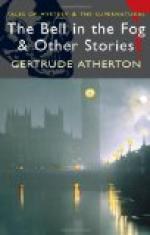He went back to the library and locked up the tour de force which had ceased to command his classic faculty. At once, he began to write the story of the brief lives of the children, much to the amazement of that faculty, which was little accustomed to the simplicities. Nevertheless, before he had written three chapters, he knew that he was at work upon a masterpiece—and more: he was experiencing a pleasure so keen that once and again his hand trembled, and he saw the page through a mist. Although his characters had always been objective to himself and his more patient readers, none knew better than he—a man of no delusions—that they were so remote and exclusive as barely to escape being mere mentalities; they were never the pulsing living creations of the more full-blooded genius. But he had been content to have it so. His creations might find and leave him cold, but he had known his highest satisfaction in chiselling the statuettes, extracting subtle and elevating harmonies, while combining words as no man of his tongue had combined them before.
But the children were not statuettes. He had loved and brooded over them long ere he had thought to tuck them into his pen, and on its first stroke they danced out alive. The old mansion echoed with their laughter, with their delightful and original pranks. Mr. Orth knew nothing of children, therefore all the pranks he invented were as original as his faculty. The little girl clung to his hand or knee as they both followed the adventurous course of their common idol, the boy. When Orth realized how alive they were, he opened each room of his home to them in turn, that evermore he might have sacred and poignant memories with all parts of the stately mansion where he must dwell alone to the end. He selected their bedrooms, and hovered over them—not through infantile disorders, which were beyond even his imagination,—but through those painful intervals incident upon the enterprising spirit of the boy and the devoted obedience of the girl to fraternal command. He ignored the second Lord Teignmouth; he was himself their father, and he admired himself extravagantly for the first time; art had chastened him long since. Oddly enough, the children had no mother, not even the memory of one.
He wrote the book more slowly than was his wont, and spent delightful hours pondering upon the chapter of the morrow. He looked forward to the conclusion with a sort of terror, and made up his mind that when the inevitable last word was written he should start at once for Homburg. Incalculable times a day he went to the gallery, for he no longer had any desire to write the children out of his mind, and his eyes hungered for them. They were his now. It was with an effort that he sometimes humorously reminded himself that another man had fathered them, and that their little skeletons were under the choir of the chapel. Not even for peace of mind would he have descended into the vaults of the lords of Chillingsworth and looked upon the marble effigies of his children. Nevertheless, when in a superhumorous mood, he dwelt upon his high satisfaction in having been enabled by his great-aunt to purchase all that was left of them.




